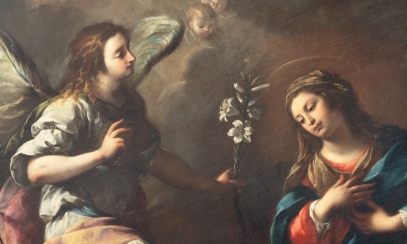The leadership role of the bishop
The recent health care debate and, particularly, the actions by the Catholic Health Association, have raised questions about the governing ministry of the bishops. The Second Vatican Council stated: “Bishops … govern the particular churches entrusted to them by their counsel, exhortations, example and even by their authority and sacred power, which indeed they use only for the edification of their flock in truth and holiness” always remembering to be a servant. (Lumen gentium, #27)
Pope John Paul II noted that “the exercise of authority in the Church has often proved taxing.” He wrote that this authority will only be appreciated if we understand that it is “founded on the charism of apostolicity.” (Pastores gregis, #43) Thus Pope John Paul concluded that bishops are to exercise authority as the apostles did, both by their words and the witness of their lives. It is his task to order the priestly, prophetic and kingly mission of all the people of God (clergy and laity) in his diocese, such that all builds up the body of Christ. Communion, being in union with one another, which the whole church, and with God, is the key aim of all ministry.
Thus the bishop is not only called to witness to the truth, but he is also called to “evaluate and discipline its outward expression by the believers entrusted to his pastoral care.” (Pastores gregis, #44)
It is this last line which can prove taxing. However, if the aim of all the governing activity of the bishop is to create and nurture those “tissues of communion,” as Cardinal George of Chicago has stated, then the aim is already supported by the gift of the Holy Spirit.
Building up the body of Christ means building up relationships, making connections, and realizing that we are sisters and brothers in the Lord. Now this does not mean that the bishop is simply the moderator of dialogue, as if he were merely a master of ceremonies. No, he is responsible before God, and will be judged thusly, for the actual communion in faith, hope and love of the portion of the flock entrusted to his care. Thus, leading and belonging to the flock are the two stances which the bishop must always have.
This signals that the church, and all those who claim to be in communion in the church, do not decide on their own where they will go. Instead, it is the Holy Spirit, promised to the church, and particularly to Peter and the apostles, who guides us all toward heaven and final communion with the Trinity.
When Catholics, even groups of Catholics, such as the CHA, act apart from the bishops and, in fact, even contrary to the bishops, they are serving to harm communion. They act like the lost sheep who chose to wander off on its own seeking pastures that are not meant for it. The aim of the bishops, then, is to go out in search of such lost sheep and try to bring them back into communion. We do this by rebuilding the relationships that have been hurt, not as disinterested emcees but as those responsible for giving an account to the Divine Master about our stewardship.
A prayer in the Liturgy of the Hours (Lent, Evening Prayer, Week I, III, IV), recited by clergy, religious and many laity, states: “Father of all holiness, you gave us Christ as the shepherd of our souls; stay with your shepherds and the flock entrusted to them, do not leave the flock without the loving care of its shepherd, do not leave your shepherds without an obedient flock to follow them.” The very apostolic nature of the church requires that we remain in the flock. Around 255, St. Cyprian of North Africa wrote:
Whoever is not with the bishop is not in the Church. You must understand that it is to no avail that people may beguile themselves with the illusion that whilst they are not at peace with the bishops of God, they may still worm their way in and surreptitiously hold communion with certain people. (Unity of the Church 66:8:3)
This sacred duty to guide the flock is necessary for its unity, so that we may all journey together toward salvation.



